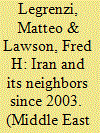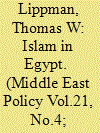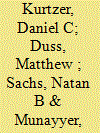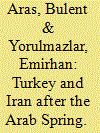|
|
|
Sort Order |
|
|
|
Items / Page
|
|
|
|
|
|
|
| Srl | Item |
| 1 |
ID:
136185


|
|
|
|
|
| Summary/Abstract |
Over the past decade, formerly close U.S.-Saudi relations have been under immense political pressure, in private and increasingly in the public media, as the two governments have dealt with the consequences of the 9/11 attacks, the 2003 Iraq War and the Arab Spring. However, there are significant U.S. interests at stake in the Middle East that require Washington to maintain at least a working relationship with Riyadh:
|
|
|
|
|
|
|
|
|
|
|
|
|
|
|
|
| 2 |
ID:
136198


|
|
|
|
|
| Summary/Abstract |
Will Rogers once observed that “when you get into trouble 5,000 miles from home, you've got to have been looking for it.” It's a good deal more than 5,000 miles to Baghdad or Damascus from here. And, boy, have we gotten into trouble! We are trying to cope with the cumulative consequences of multiple failures. Just about every American project in the Middle East has now come a cropper. There is a new military campaign-morale patch commemorating this. It is available through Amazon.com for $7.45. The patch bears an escutcheon with a logo that, in the interest of decorum, I will not read out. It sounds like Operation Enduring Fluster Cluck.
|
|
|
|
|
|
|
|
|
|
|
|
|
|
|
|
| 3 |
ID:
136201


|
|
|
|
|
| Summary/Abstract |
Since the 1980s, after two decades of low and stable international food prices, the world's agricultural commodities markets began to experience the effects of a number of structural factors that had been silently increasing the prices of basic food commodities. By the second half of 2008, when the world's economy was hit by an unanticipated financial meltdown, the global food-price crisis had already set in. The latter's impacts and long-term effects were much more universal and pervasive than those of the former. Despite how interconnected many parts of the world's financial markets were, many countries were neither directly nor deeply, if at all, involved in the highly complex financial practices and products adopted by the giant U.S. and European institutions whose collapse triggered the markets’ crash. This was not the case for agricultural and food-commodity markets. All over the world people depended in one form or another on these markets, whether as consumers, producers, or both.
|
|
|
|
|
|
|
|
|
|
|
|
|
|
|
|
| 4 |
ID:
136205


|
|
|
|
|
| Summary/Abstract |
Iranian foreign policy in the 25 years after the 1978-79 revolution centered on the cultivation of strategic alignments with a wide range of radical states and revolutionary movements throughout the Middle East. Relations with this heterogeneous collection of regional partners, particularly those with Syria and the Lebanese Shii organization Party of God (iezbollah), left the Islamic Republic vulnerable to periodic threats of entrap¬ment and abandonment by its allies. This in turn had a direct impact on Iran's relations with regional adversaries
|
|
|
|
|
|
|
|
|
|
|
|
|
|
|
|
| 5 |
ID:
136202


|
|
|
|
|
| Summary/Abstract |
Iran is alone in the world. Its acute strategic loneliness is primarily the result of structural factors inherent in its place in the regional and international systems and is largely independent of the actions of whoever governs the country. Its international posture does not render cooperation with other states impossible, nor does it predetermine a condition of permanent conflict with its neighbors. Strategic loneliness, however, explains why Iran has very limited common interests with its neighbors and why cooperation is difficult and costly to achieve. Tehran's policies, as a result, can worsen or improve the situation but cannot fundamentally change it.
|
|
|
|
|
|
|
|
|
|
|
|
|
|
|
|
| 6 |
ID:
136213


|
|
|
|
|
| Summary/Abstract |
Iran and Turkey two non-Arab middle eastern states are among largest and most populous in the Iran and Turkey, the two non-Arab Middle Eastern states, are among region. The former occupies a strategic location on the Persian Gulf and the Strait of Hormuz; while the latter controls the Straits — the Bosporus, the Sea of Marmara, the Dardanelles —that link the Black and Aegean Seas. The two nations descend from the most ancient civilizations in the world and have strong national identities. Both are predominantly Muslim. The majority of Iranians are Shiite, and since the 1979 Islamic Revolution their government has been based on the velayat elaqih doctrine (rule by an Islamic jurist). Turkey, prominently Sunni, is a secular state.
|
|
|
|
|
|
|
|
|
|
|
|
|
|
|
|
| 7 |
ID:
136214


|
|
|
|
|
| Summary/Abstract |
After the assassination of Egyptian President Anwar Sadat on October 6, 1981, inves¬tigators determined that the attack had been carried out by Islamic militants who had in¬filtrated Egypt's armed forces. They arranged to participate in the annual military parade that commemorated the start of the 1973 war against Israel. Knowing that Sadat would be in a prominent position on the reviewing stand, soldiers armed with rifles and grenades emerged from a stopped truck and opened fire. Sadat was dead before reaching a hospital. Shortly afterward, political and intelligence analysts al the U.S. embassy in Cairo under¬took an effort to understand the causes, extent and implications of the religious radicalism that had taken root in Egypt in the late 1970s. A year after Sedatedeath, the embassy produced an extensive two-part report that was sent to the State Department and to other U.S. embassies in the Arab world. It was signed by Ambassador Alfred L. Atherton, but diplomatic dispatches are customarily sent out over the ambassador's signature. This was almost certainly a 'group effort. Now declassified, it was made available by the indefati¬gable researchers at the National Security Archive, an independent organization based at George Washington University in Washington, D.C. Three decades after it was written, it is still a useful analysis of a phenomenon that has since spread across large parts of the Arab and Muslim worlds. Reformatted to eliminate the typographical peculiarities of State Department cables, it is published here for the first time.
|
|
|
|
|
|
|
|
|
|
|
|
|
|
|
|
| 8 |
ID:
136200


|
|
|
|
|
| Summary/Abstract |
The dramatic victories in summer 2014 of the Islamic State in Iraq and Syria (ISIS) over rival groups fighting the regime of Bashar al-Assad — and over the government of Iraq and Kurdish forces — culminated in the declaration of a caliphate, or the Islamic State. The international community became alarmed, and the lightning ISIS advance in Iraq was blunted in mid-August by U.S. air power. Air strikes were ramped up in September and October in both Iraq and Syria by the United States and an ad hoc coalition of Middle Eastern and European states
|
|
|
|
|
|
|
|
|
|
|
|
|
|
|
|
| 9 |
ID:
136184


|
|
|
|
|
| Summary/Abstract |
There have been six Nobel peace prizes given for the Arab-Israeli conflict. In 1950, Ralph Bunche got it for negotiating the armistice. In 1978, Anwar Sadat and Menachem Begin received it for negotiating Camp David. In 1994, Arafat, Rabin and Peres got it for negotiating the Oslo accords. Then Carter got a Nobel Prize in 2002 for a variety of reasons, including the work that he did on the Arab-Israeli peace talks.
|
|
|
|
|
|
|
|
|
|
|
|
|
|
|
|
| 10 |
ID:
136196


|
|
|
| 11 |
ID:
136197


|
|
|
|
|
| Summary/Abstract |
In Washington, the road from legislative intent to policy implementation is paved with politics. As a result, where that road leads often has little to do with where it was meant to go. Take the Export Administration Act, for example. One of its provisions requires the secretary of state to maintain a list of countries that are state sponsors of terrorism so that sanctions can be applied to them. State sponsors are defined as those countries that have repeatedly provided support for acts of international terrorism.1 This sounds straightforward, but the way the requirement has been implemented has left countries on the list that should be off and others off that should be on. And in every case it seems politics is the determining factor.
|
|
|
|
|
|
|
|
|
|
|
|
|
|
|
|
| 12 |
ID:
136209


|
|
|
|
|
| Summary/Abstract |
When the political landscape in the Middle East appeared on the brink of transforma
tion back in early 2011, Turkey and Iran, for different reasons, were delighted. Each envisioned an exten¬sion of ito national sphere of influence. Both Ankara and Tehran declared them¬selves the standard bearers for "demo¬cratic" rule and civilian empowennent. For Ankara, this regional transformation was, in the words of Foreign Minister Ahmet Davutoglu, a “normalization" process —a quest for good governance and integra¬tion into the international community. The tide was thought to be turning towards the eclectic Turkish model, a combination of local traditions with the universal practices of democracy, humen rights and a market economy. A series of early events seemed confirm that the Turkish model for po-litical conciliation and regional economic integration wu emerging the new politi¬cal none in the Middle East.
|
|
|
|
|
|
|
|
|
|
|
|
|
|
|
|
|
|
|
|
|